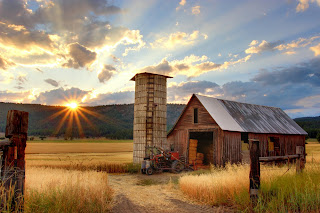Until the Harvest Time Comes: Matthew 13:24-30, 36-43 - Sixth Sunday after Epiphany
This is day 43 of 2023. What a year it has been…
On January 2, Brackenridge Police Chief Justin McIntyre was brutally gunned down by a career criminal who would later die in a shootout with police.
On January 6, a six-year-old student took out a gun and shot his teacher at an elementary school in Virginia.
On January 7, five police officers in Memphis brutally beat Tyre Nicholas, an unarmed black man—and later were seen fist-bumping each other for a job well done. Nichols would die a few days later in the hospital.
113 people died in 71 mass shootings since the beginning of the year (as of 10 February).
On Monday, February 6, McKeesport Police officer Sean Sluganski was shot and killed by a suspect who also shot and wounded Officer Charles Thomas.
Before the dust even settles, outrage and blame are hurled across all our political, social, and ideological divides—and our fear and mistrust of the other grows more intense. This practically sets the stage for more of the same atrocities to recur—and more frequently.
How can we keep on living in a world that has gone so far off the rails?
In today’s Gospel, Jesus’s Parable of the Wheat and the Weeds addresses the hostility which Jesus and his disciples encounter in their ministry. Jesus warns that some will follow him, but many will not. Some will do his will, but many will not. Those who follow Jesus will face hatred, persecution, and even death. Even as Jesus’s builds up his kingdom that is not of this world, his disciples will still have to live in this world.
The enemies who hate and oppose them are the weeds; but Christ, the Son of Man, sows good seed which becomes the wheat. The purpose of the wheat (or the children of the kingdom) is to bear fruits of righteousness despite having to share the same soil with the weeds.
If you garden, one of your most time-consuming tasks will be removing the weeds, which will keep popping up, despite your best efforts to eradicate them. You will need to be careful in pulling the weeds, because you risk destroying whatever it is you want to grow. This is precisely the reason why the landowner, in the parable, prohibits his slaves from gathering up the weeds. The wheat and the weeds must coexist until harvest time. That’s not the way we want it for our gardens and our fields, but that’s the way it will be in God’s world, until the harvest time.
 |
| Photo by Timothy Eberly on Unsplash |
Furthermore, it isn’t the job of the wheat to identify the weeds and eliminate them. That’s the gardener’s job. The wheat’s job is to bear fruit, even while coexisting among the weeds.
This means that the Christian has no choice but to live among people who do not share your beliefs or their values. The Christian must bear the fruits of justice, peace, and righteousness among people who will ridicule, harass, persecute, and even kill you. Or, to put it another way, the Christian must coexist among people who will not want to coexist with you.
Christians have always lived among hostility and hate, and they certainly do today in many parts of the world. They risk their lives when they gather for worship or carry a bible.
21st century America is radically different. Even with fewer and fewer people going to church, Christians still have tremendous power and influence within our society. We are not being persecuted. But the animosities between liberals and conservatives have become so intense that we don’t want to coexist. We would rather fight. It’s terrifying how many people are eager to fight a culture war and even a violent civil war.
But every time a body of people have banded together to destroy another people, they destroy themselves in the process. We can’t allow our hostilities or our lust for power to rip apart our schools, our communities, our churches, and our democracy. We need all these institutions to succeed in a shared mission to improve people’s lives and empower good citizenship.
The Holy Spirit has put us here now to bear fruits, because the world is starving for them. This includes actual bread and the necessities of life, but other fruits as well—like compassion, acceptance, friendship, justice, peacemaking, and education. Imagine how much good we could do if we were to stop our shaming, blaming and hating, and worked together towards common goals. Just imagine how much our church can transform our society by helping people to discover their God-given talents and empowering them to use them!
I’m not saying that we should acquiesce to those who do harm to us and the neighbor. Doing justice and loving righteousness means we call out and confront evil.
But the fact remains that if you are the wheat, it is because of God’s grace. It is because God created you for this purpose. You bear good fruit when you are rooted in the righteousness of Jesus. And the presence of the weeds and the prevalence of evil cannot stop you from living out this purpose.
The secret of the people of God is we are strongest and most faithful in times of struggle and persecution, because that’s when we’re truly living by faith alone, and by grace alone.
God’s faithfulness and the fruits that we bear in him are greater and more powerful than all the shootings and the earthquakes.
The fruits we bear today will be a beautiful foretaste of the glorious feast that will happen when the harvest time comes.


Comments
Post a Comment